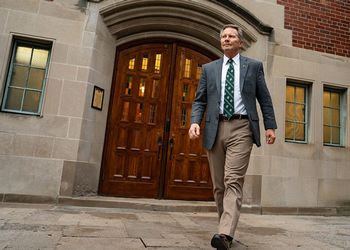Feature: MSU Plant Breeding and Genetics Program

MSU’s little known plant breeding and genetics program has had a huge impact on the food we eat.
The next time you bite into a juicy strawberry devour an ear of sweet corn, eat a potato chip, or pop a cherry tomato in your mouth, thank a plant breeder.
In fact, the reason that the world eats as well as it does today speaks volumes on the efforts of an unheralded group of scientists known as plant breeders and geneticists. From developing disease-resistant varieties of potatoes to discovering how plants become tolerant to cold, their research is responsible for creating fruit, vegetable and grain varieties that can better adapt to a variety of growing conditions while feeding growing populations of people and animals. This research also looks at even the tiniest components of plant life that may hold answers to health and nutrition questions.
The Plant Breeding and Genetics (PBG) program at Michigan State University is one of a handful of such programs in the country that is quietly graduating master’s and doctoral students from all over the world in plant breeding and genetics. Created in 1981, it encompasses faculty members from the departments of Crop and Soil Sciences, Forestry, Horticulture, Plant Biology, and Plant Pathology, and is considered a landmark interdepartmental program.
“This program was the first of its kind in the College of Agriculture and Natural Resources,” Ken Sink, first PBG program director, says. “It brought plant breeders from the faculty of the departments of Crop and Soil Sciences and Horticulture together in a unified program. Many of those original faculty members are still active in the program.”
“This program touches all aspects of breeding and genetics,” says Jim Hancock, director of the PBG program since 2002. “Students learn everything from conventional plant breeding to molecular biology, and the faculty members have knowledge that spans all aspects of the research spectrum.
“There is also a blend of national and international students that makes it interesting and gives students a broad perspective,” he says. “For example, during a class discussion about weed improvement involving strains of wild wheat, there may be students who’ve never seen wild wheat, whereas others have it growing outside their door in their native country. We have students who want to breed potatoes for indigenous people in South America, and at the same time, we have students who are interested in breeding potatoes for chip processors in Idaho. The synergism that develops is amazing.”
Students in the program not only learn conventional methods of manipulating plant species, they study and implement new biotechnological advances, making this a progressive program encompassing both conventional breeding and molecular genetics.
But their education goes beyond the labs and classrooms. Through student activities such as the National Needs Fellowship program organized by Richard Allison and eight other scientists, students are made aware of the biological, sociological and environmental issues surrounding plant breeding and biotechnology, as well as its impact on developing versus industrialized nations.
“The main reason I came to MSU’s program was the sense of community,” says Veronica Vallejo, a graduate student in dry bean breeding and genetics. “If there is anything you need, there is a faculty member who can help. Because they collaborate together, the students feel totally comfortable going to any of them.
“I was also drawn to the wide diversity of research within the program,” she says. “It ranges from the most basic to the most applied, and the plant science facilities at Michigan State are superior to any other I looked at.”
Vallejo works in dry bean breeder James Kelly’s lab, doing basic research in disease resistance in dry beans.
“The students lean on each other, go to each other’s labs with questions and generally use each other as resources,” she says. “Another plus for students like me who plan to pursue careers in academia, there is the opportunity to receive a teaching certificate from the College of Education. It gives me an edge when it comes time to find a faculty position.”
“It’s programs like this that are sending plant breeders into developing nations as well as agricultural industry,” says Hancock. “Increases in agricultural productivity, food quality, disease resistance and reduced use of chemicals are direct results of plant breeding and genetics research. Many people think that it’s factors such as fertilizer application or irrigation practices that make the difference in crops, but it’s really plant breeding.”
“When it comes down to it, plant breeders and geneticists are servicing the food and fiber needs of mankind worldwide,” Sink adds.
More information on the MSU Plant Breeding and Genetics program can be found on its Web site: www.hrt.msu.edu/pbgp/index.html or by calling (517)-353-2913.
Robin Usborne Millsap, ’80, received her degree in agricultural communications and is currently the information officer for the Michigan Agricultural Experiment Station at MSU.



